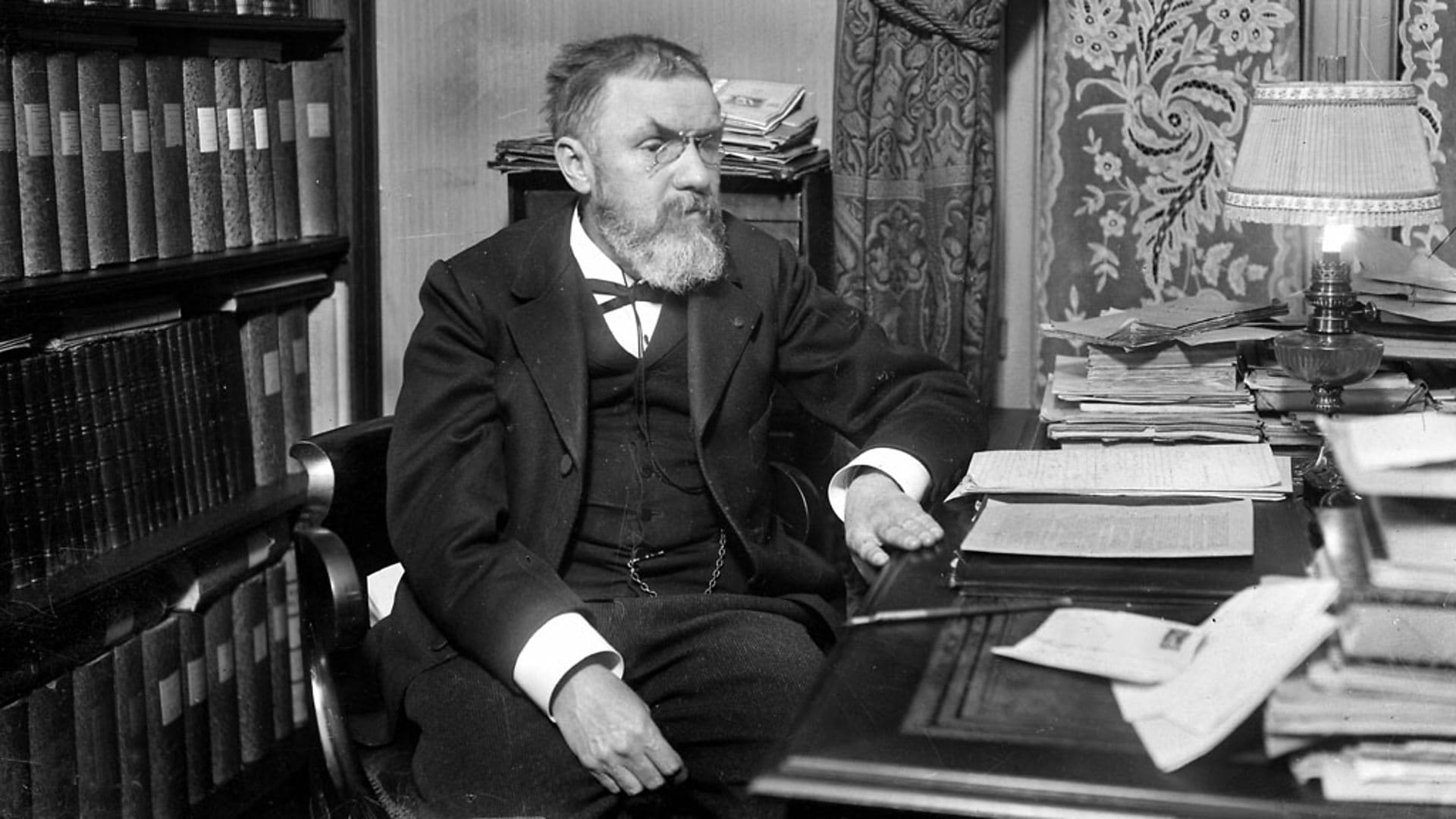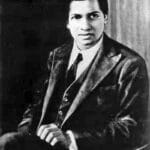Unveiling the Genius of Jules Henri Poincaré
Get ready to have your mind blown as we dive into the incredible world of Jules Henri Poincaré, a name synonymous with genius. This wasn’t just your average mathematician, scribbling away at equations in isolation. Poincaré was a scientific polymath whose intellect transcended disciplines, earning him the title of “The Last Universalist.” He navigated the complex landscapes of mathematics, physics, and philosophy with unparalleled grace, leaving an indelible mark on our understanding of the universe.
10 Astonishing Facts about Jules Henri Poincaré
1. The “Last Universalist” – A Renaissance Mind in the World of Science
Jules Henri Poincaré wasn’t confined to the ivory tower of mathematics. His brilliance illuminated diverse fields, from the abstract realms of topology and chaos theory to the complexities of celestial mechanics and the philosophical foundations of science itself. This unique versatility earned him the title of “The Last Universalist,” a testament to his ability to master and synthesize knowledge across disciplines in a way rarely seen in modern science.
2. Cracking the Code: Poincaré’s Conjecture and a Century-Long Quest
Imagine posing a mathematical puzzle so intricate that it baffles the world’s brightest minds for over a hundred years. That was the legacy of Poincaré’s Conjecture, a question about the very essence of three-dimensional shapes. This wasn’t just a mathematical curiosity; it became a testament to the enduring power of Poincaré’s ideas, finally being solved in 2002 by Grigori Perelman, sending shockwaves through the world of mathematics.
3. Embracing Chaos: Poincaré’s Unpredictable Legacy
We often perceive science as a quest for order and predictability. Poincaré, however, recognized the delicate dance between order and chaos that underpins the universe. His work revealed hidden patterns of unpredictability, demonstrating that even seemingly stable systems, from planetary orbits to weather patterns, harbor an element of inherent chaos. This groundbreaking insight laid the foundation for chaos theory, a field that continues to reshape our understanding of complex systems.
4. Beyond Einstein: Poincaré’s Influence on the Path to Relativity
Albert Einstein’s theory of relativity is a cornerstone of modern physics, but few realize the profound influence of Poincaré’s earlier work. While Einstein often receives the lion’s share of credit, Poincaré’s explorations of space, time, and the concept of simultaneity provided essential building blocks for this revolutionary theory. It’s a testament to Poincaré’s genius that his ideas paved the way for one of the most significant scientific breakthroughs in history.
5. A Prolific Pen: Over 500 Papers and 30 Books
Some struggle to articulate their thoughts, but Poincaré wielded language with the same mastery as he did mathematical equations. Throughout his career, he authored over 500 scientific papers and 30 books, an astounding testament to his intellectual productivity. But these weren’t mere academic exercises; Poincaré’s writings were renowned for their clarity, insight, and groundbreaking ideas that shaped scientific thought for generations to come.
6. More Than Math: The Skeptical and Intuitive Philosopher
Poincaré’s intellect defied categorization. He wasn’t just a scientist who calculated; he was a philosopher who contemplated the very nature of knowledge and discovery. Unlike those who clung to the illusion of absolute truth, Poincaré embraced skepticism, believing that scientific “truths” were provisional, subject to revision as our understanding evolves. He also championed the role of intuition in scientific thought, recognizing that sometimes, those “aha!” moments arise not solely from logic but from trusting our creative instincts.
7. An Unexpected Muse: Poincaré and the Art of the Abstract
The worlds of mathematics and art may seem disparate, but Poincaré’s ideas transcended disciplinary boundaries. His work on non-Euclidean geometry, where parallel lines converge and space bends in unexpected ways, sparked a creative fire in the art world. Movements like Cubism and Surrealism, with their fragmented perspectives and explorations of abstract space, drew inspiration from Poincaré’s mathematical insights, demonstrating the unexpected interplay between seemingly disparate fields.
8. Recognition Among the Best: The French Academy of Sciences
In the realm of science, the French Academy of Sciences stands as a beacon of excellence, and being elected to this prestigious institution is a testament to extraordinary achievement. Poincaré’s election came as no surprise, a well-deserved recognition of his exceptional contributions to multiple scientific domains.
9. Leading the Next Generation: President of the International Congress of Mathematicians
Poincaré’s brilliance wasn’t confined to solitary pursuits. He actively fostered the growth of the mathematical community, serving as President of the International Congress of Mathematicians (ICM), a gathering of the world’s brightest mathematical minds. In this role, he acted as a mentor and guide, nurturing the next generation of thinkers and shaping the future of mathematical exploration.
10. Glimpses of the Future: Poincaré’s Visionary Predictions
Some might call him a futurist; others a visionary. Poincaré possessed an uncanny ability to peer beyond the horizon of his time, and his predictions about science and technology were startlingly prescient. From the complexities of quantum mechanics to the ethical dilemmas posed by artificial intelligence, his insights continue to resonate with striking relevance in our modern world. Poincaré understood that the quest for knowledge was an ongoing journey, and his work continues to illuminate the path for those who follow in his footsteps.
Delving Deeper: What Made Henri Poincaré So Remarkable?
We’ve explored the highlights of Poincaré’s astonishing career, but what specific discoveries and contributions solidified his place in the pantheon of scientific giants? Let’s delve further into the intricate details of his work.
1. Taming Chaos: The Birth of a Theory
Imagine a world where everything seems utterly random, governed by chance and unpredictability. Poincaré wasn’t content with such a chaotic view. While studying the seemingly predictable realm of celestial mechanics – the movements of planets and stars – he stumbled upon a revolutionary concept: chaos theory. This theory, born from Poincaré’s observations of the intricate interactions of celestial bodies, revealed that even within systems governed by deterministic laws, tiny variations in initial conditions could lead to wildly divergent outcomes.
This wasn’t just an abstract mathematical notion; it had profound implications for our understanding of everything from weather patterns to the stock market. Poincaré’s work demonstrated that beneath the seeming randomness of complex systems, there existed an underlying order, a delicate dance between predictability and chaos that continues to fascinate and challenge scientists today.
2. The Poincaré Conjecture: A Century-Long Puzzle
Some mathematical problems are so elegantly simple to state yet so fiendishly difficult to solve that they take on a life of their own. The Poincaré Conjecture was one such problem. In essence, it proposed that any shape without holes that can be stretched and deformed into a sphere is fundamentally, topologically, a sphere. Sounds straightforward, right?
However, proving this seemingly obvious statement in the rigorous language of mathematics stumped mathematicians for over a century. It became a holy grail, a test of mathematical ingenuity that lured countless brilliant minds into its intricate web. Finally, in 2003, Russian mathematician Grigori Perelman published a series of papers that provided the long-sought-after proof, building upon the foundation laid by Poincaré and finally bringing closure to one of mathematics’ most enduring mysteries.
3. Relativity’s Roots: Poincaré’s Unacknowledged Influence
When we think of relativity, the name Albert Einstein immediately springs to mind. However, the story of relativity’s development is more nuanced than often portrayed. While Einstein rightfully deserves immense credit for his groundbreaking work, it’s crucial to acknowledge the significant contributions of Henri Poincaré.
Years before Einstein published his theory of special relativity, Poincaré was already grappling with the fundamental nature of space and time. He developed key concepts, such as the relativity of simultaneity – the idea that there is no absolute, universal “now” – and even derived mathematical transformations remarkably similar to those later used by Einstein in his theory.
While the extent of Poincaré’s direct influence on Einstein remains a subject of debate among historians of science, it’s undeniable that his work laid crucial groundwork, challenging the Newtonian understanding of space and time and paving the way for Einstein’s revolutionary insights.
4. A Legacy of Innovation: Beyond the Headlines
Poincaré’s brilliance wasn’t confined to a few headline-grabbing discoveries. His intellectual curiosity led him to make significant contributions to a wide range of mathematical and scientific fields, including:
- Differential Equations: These mathematical expressions describe the relationships between changing quantities and are essential for modeling and understanding countless phenomena in physics, engineering, and other fields. Poincaré developed novel techniques for analyzing and solving differential equations, making significant strides in our ability to model and predict complex systems.
- Topology: Often described as “rubber sheet geometry,” topology studies the properties of shapes and spaces that remain unchanged under continuous deformations – stretching, twisting, bending, but no tearing or gluing. Poincaré is considered one of the founding fathers of algebraic topology, a branch that uses algebraic tools to study topological spaces. His work laid the groundwork for this field’s development, providing a new lens through which to view the very fabric of space and shape.
- Celestial Mechanics: The study of the movements of celestial objects has fascinated astronomers for centuries. Poincaré made significant contributions to this field, building upon Newton’s laws of motion and gravitation but introducing new mathematical techniques to address the complexities of multi-body systems. His work on the “three-body problem” – attempting to predict the motions of three celestial bodies under mutual gravitational attraction – was particularly influential, demonstrating the inherent chaotic behavior of such systems and laying the seeds for chaos theory.
5. The Essence of Poincaré’s Genius: More Than Just a Mathematician
What truly set Henri Poincaré apart was not just his mastery of individual mathematical concepts or his groundbreaking discoveries in physics. It was his unique approach to knowledge itself. Poincaré embodied the spirit of a true polymath, seamlessly weaving together ideas from mathematics, physics, philosophy, and even art. He recognized the interconnectedness of knowledge, understanding that seemingly disparate fields could illuminate and enrich one another.
He was deeply interested in the nature of scientific inquiry, questioning how we arrive at knowledge and the role of intuition and aesthetics in scientific discovery. His philosophical writings remain relevant today, reminding us that science is not merely a cold, objective pursuit of facts but a deeply human endeavor driven by curiosity, creativity, and the enduring quest to understand the universe and our place within it.
Henri Poincaré’s Enduring Impact: A Legacy for the Ages
Jules Henri Poincaré’s influence extends far beyond the confines of academic textbooks or dusty library shelves. His ideas continue to resonate in countless fields, shaping our understanding of the cosmos and inspiring new generations of thinkers.
Poincaré’s legacy is a testament to the power of intellectual curiosity, the beauty of interdisciplinary thought, and the enduring human quest to unravel the mysteries of the universe we inhabit. He reminds us that science is not a static body of knowledge, but a dynamic, ever-evolving process driven by both rigorous logic and the spark of creative imagination. As we continue to explore the frontiers of knowledge, Poincaré’s extraordinary mind and his enduring contributions will undoubtedly continue to illuminate the path for generations to come.
















